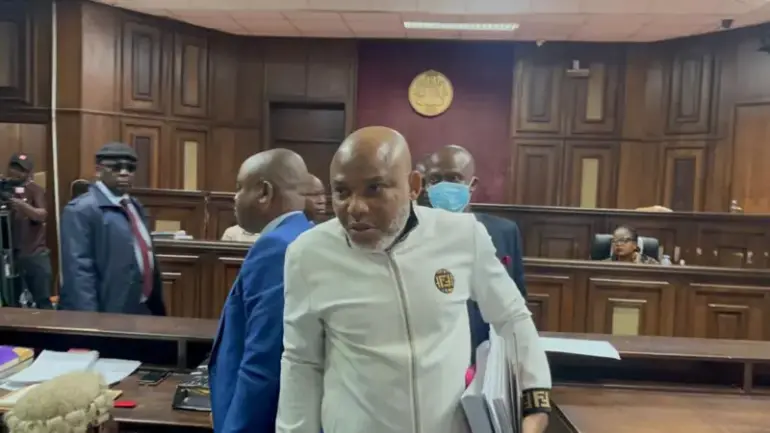The Federal High Court in Abuja has sentenced the detained leader of the Indigenous People of Biafra (IPOB), Nnamdi Kanu, to life imprisonment after finding him guilty of multiple terrorism charges.
Delivering judgment on Thursday, Justice James Omotosho held that the prosecution proved its case beyond reasonable doubt, convicting Kanu on several counts related to terrorism, incitement, membership of a proscribed organisation, and threats against diplomatic missions.
Justice Omotosho imposed life imprisonment on Counts One, Four, Five and Six. He also sentenced Kanu to 20 years’ imprisonment on Count Three and five years on Count Seven, with no option of fine. All sentences are to run concurrently. The judge ordered that Kanu be kept in a secure facility and barred from accessing digital devices, adding that the IPOB leader’s transmitter should be forfeited to the Federal Government.
Before sentencing, the court found Kanu guilty of acts of terrorism against the Nigerian state. The judge stated that the defendant failed to respond to key allegations and deliberately refused to enter a defence. He said prosecution evidence showed that Kanu issued threats, ordered violent attacks, declared illegal sit-at-home directives and encouraged assaults on security personnel and public infrastructure—actions the court deemed preparatory and actual acts of terrorism.
Justice Omotosho read transcripts of Kanu’s broadcasts, quoting statements in which he urged supporters to ambush security forces, seize their weapons, and carry out violent attacks, including threats against airports and foreign missions.
The judge further classified Kanu as an “international terrorist,” saying his threats against the British High Commission, former UK High Commissioner Catriona Laing, and the US Embassy amounted to terrorism under Section 3 of the Terrorism Prevention Amendment Act (2013). He added that Kanu’s activities, like those of Boko Haram and other extremist groups, had destroyed lives and property and undermined national security, particularly in the South-East.
The court rejected Kanu’s argument that his actions were part of a struggle for self-determination, noting that while the right exists under the African Charter, it must be pursued legally through constitutional amendment, not through violence or intimidation.
There was mild drama earlier in the court session when Kanu protested that the trial could not proceed because he had not filed his final written address. Raising his voice, he told the judge: “You don’t know the law. Show me where you have the right to waive my right to a final address.” Justice Omotosho later ordered Kanu removed from the courtroom for unruly conduct and delivered judgment in his absence.
Before sentencing, counsel for the Federal Government, Gboyega Awomolo (SAN), urged the court to impose the death penalty, arguing that the families of 75 slain security personnel were awaiting justice. He said Kanu had shown no remorse and violated the spirit of the Administration of Criminal Justice Act.
A consultant to Kanu, Aloy Ejimakor, vowed to challenge the conviction immediately. He described the judgment as “a travesty of justice,” arguing that Kanu was convicted for “what he said, not what he did.” He added that the case would be taken before the Court of Appeal and, if necessary, the Supreme Court.
Since his arrest in October 2015, Kanu has been at the centre of one of Nigeria’s most protracted and politically charged legal battles, marked by dramatic events, international disputes and recurring debates over due process and human rights.


